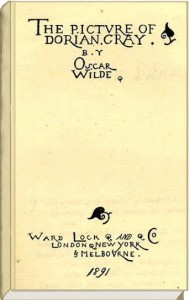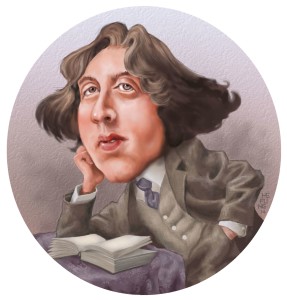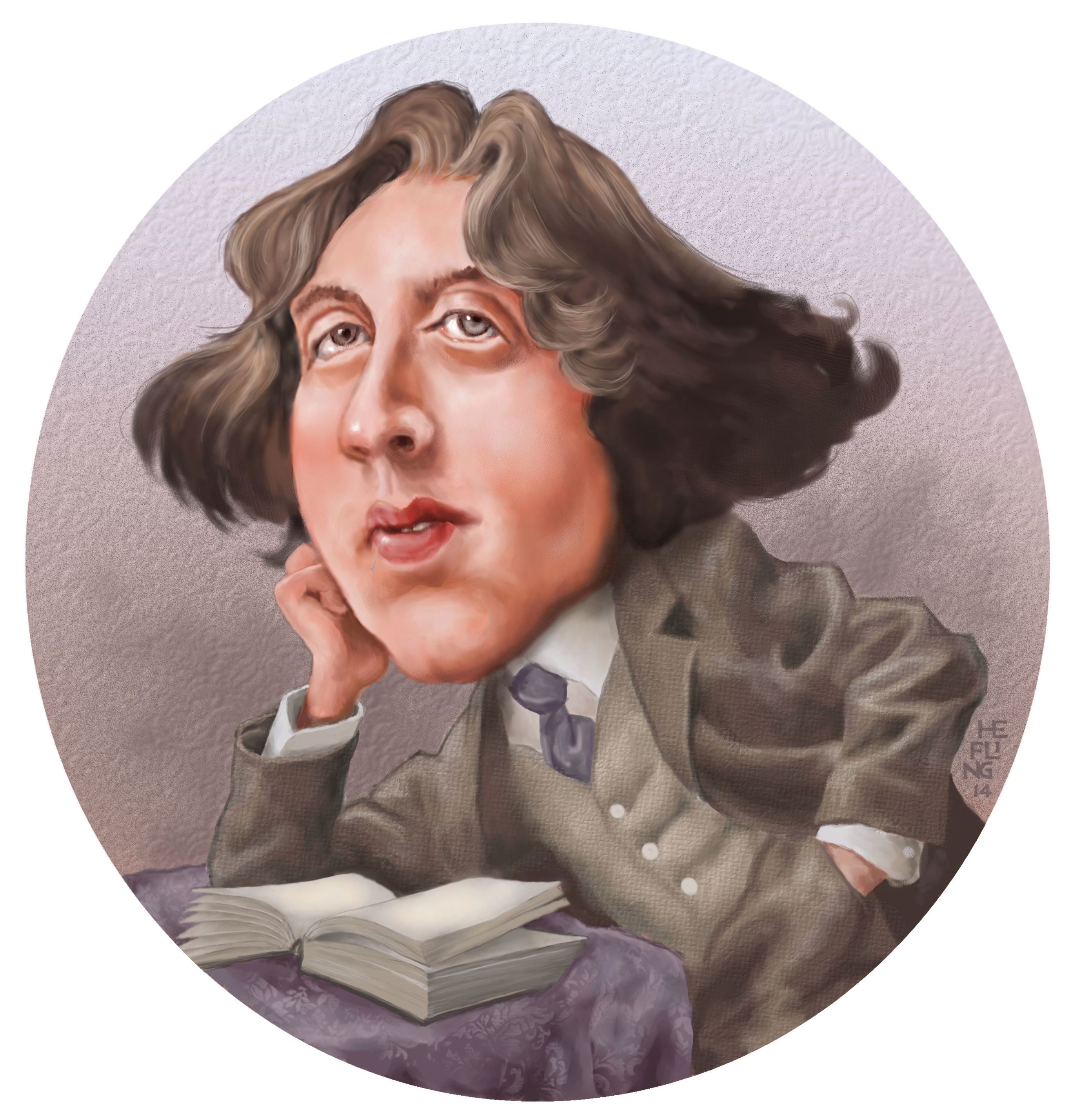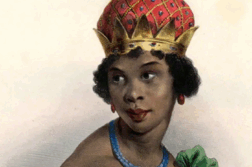THE AUTHOR of this piece passed away in 2011, having contributed many articles to this publication over the years, including this feature-length review of a book with the somewhat salacious title, The Secret Life of Oscar Wilde (2005), by Neil McKenna. While Hattersley doesn’t directly address the question of The Picture of Dorian Gray’s primacy as a gay novel, he does venture that it  was, “while cautious, implicitly homosexual”—at least for cognoscenti who knew what to look for.
was, “while cautious, implicitly homosexual”—at least for cognoscenti who knew what to look for.
This obfuscation is what makes Dorian Gray’s place in the gay canon so open to debate. The novel’s very coyness on the matter of same-sex desire, its not daring to name “the love,” is what prevents it from being a shoo-in as the first gay novel in English. Wilde is not to blame, of course (and notwithstanding that a few of the most suggestive sentences were excised by his publisher): late Victorian society simply did not allow for a more explicit exploration of the love whose name could not be spoken, much less elevated to a central role in a novel. Thus Dorian’s affairs are all with women, starting with the actress Sibyl Vane, for whom he professes his undying love—before it promptly dies; and on he moves to a series of affairs of increasingly short duration with decreasingly respectable women.
And yet, there’s something about Dorian. The way that his beauty is openly admired by Basil and Lord Harry in chapter one, the voluptuous adjectives by which it is described, Dorian’s longing to remain forever young—our gaydar is never long at rest. Then there are all those vague references to corruption and sensualism and unspecified nighttime activities that eventually incur the condemnation of his erstwhile friends. (And what about those friends, whose arch conversations on art and manners, if not gay, are certainly high camp?) The character of Dorian may well have been as far “out” as any literary figure could be at the time, making Wilde’s novel the gayest to date.
A slightly longer version of the following first appeared in the November-December 2005 issue. — RS
OSCAR WILDE WAS PROBABLY the first major modern personality who was famous for being famous well before he produced any work of consequence aside from great conversation. He self-consciously personified “decadence” while still at Oxford, and soon after graduating had the honor of being satirized as the archetypal fop in Gilbert and Sullivan’s operetta Patience. The play’s huge popularity in the U.S. led impresario D’Oyly Carte to book Wilde on a U.S. lecture tour that would prove wildly successful: Wilde acted the æsthete, dressed outrageously, struck languid poses for the photographers, and was especially popular with Western cowboys and miners. His success was assured by his first comment to the American customs inspectors, widely reported by the New York press: “I have nothing to declare but my genius.”
Wilde published nothing major for nearly a decade after this early triumph. By his late twenties he was famous on two continents for little more than an attitude. He married a wo-man but pursued boys, mostly of the lower classes, relentlessly and successfully; and kept himself in the public eye through speaking tours filled with quotable epigrams and provocative public appearances in London society. Then, starting in his mid-thirties, he produced one of the most startling bursts of inspiration in English literature since Keats composed his entire body of work in the six years before his death at age 25. From 1890 to 1895, Wilde published or produced The Picture of Dorian Gray, Lady Windermere’s Fan, A Woman of No Importance, The Ideal Husband, and The Importance of Being Earnest, as well as a large body of poems and reviews. Neil McKenna mines this work for analogies to Wilde’s life and writes acutely about its relation to the contemporary political and social scene, but it is not his purpose to explore Wilde’s considerable impact on Western literature and culture.
Wilde had suddenly inundated late-Victorian society with a highly visible body of homoerotic literature, and there was bound to be a reaction. Dorian Gray, while cautious, was implicitly homosexual, and the hugely successful plays contained coded references that were obvious to the initiated. His poetry and public comments were often more explicit. He orchestrated startling and risky demonstrations, such as posing his gay friends and acolytes at play openings ostentatiously dressed and sporting artificial green carnations. Comments Neil McKenna in his recent [2005] The Secret Life of Oscar Wilde: “Oscar lived in an age when the only intellectual and historical justification for love and sex between men was the tradition of Greek paiderastia. But the trouble with Greek love was its emphasis upon love rather than sex. Sex was a conditional, subsidiary part of love. This was not enough for Oscar. He was interested in the shadow, not the song, in the body, not the soul, in lust and sex, not love.” McKenna shows that it was the pursuit and conquest of the beautiful youth—the “having” of him (in Wilde’s phrase), not the love and nurturing of him—that was central to Wilde’s agenda, and this is what got him into serious trouble. While he did eventually fall truly in love with Lord Alfred Douglas or “Bosie,” their relationship was based less on mutual lovemaking than on a relentless pursuit of young boys, whom they often traded off to each other or to other gay friends. As McKenna writes, “As they played out their drama of great love, both Oscar and Bosie were having as much sex as they could with boys and young men.”
When challenged about the homoerotic content of his work, Wilde had a ready answer: “It is only when we realize the influence of neo-Platonism on the Renaissance that we can understand the true meaning of the amatory phrases and words with which friends  were wont, at this time, to address each other. There was a kind of mystic transference of the expressions of the physical world to a sphere that was spiritual.” This was true of Plato’s philosophy, partly true of Renaissance homosexuality, and not true at all about Wilde’s actual practice. As he said later, “I used to be totally reckless of young lives. … I used to take up a boy, love him ‘passionately’ and then grow bored with him and take no notice of him. That is what I regret in my past life.” His regret did not prevent him from taking up the same pattern again and pursuing it to the end.
were wont, at this time, to address each other. There was a kind of mystic transference of the expressions of the physical world to a sphere that was spiritual.” This was true of Plato’s philosophy, partly true of Renaissance homosexuality, and not true at all about Wilde’s actual practice. As he said later, “I used to be totally reckless of young lives. … I used to take up a boy, love him ‘passionately’ and then grow bored with him and take no notice of him. That is what I regret in my past life.” His regret did not prevent him from taking up the same pattern again and pursuing it to the end.
Not surprisingly, Bosie’s mad but shrewd father, the Marquis of Queensberry, disapproved of his son’s passionate and public relationship with Oscar Wilde. Astonishingly, the Marquis simultaneously discovered that his older son and heir, Viscount Drumlanrig, was regularly being sodomized by Lord Rosebery, the sitting Prime Minister of England. Soon after being promoted to the peerage by Rosebery, and apparently learning that the Prime Minister was receiving threatening letters from his father, Drumlanrig committed suicide in a staged fox-hunting accident. Queensberry traveled to Germany, where the Prime Minister was on vacation, and tried to draw him into a boxing match, but the local authorities hustled the Marquis out of town at the request of the British government. He then turned on Wilde, leaving a note at his club accusing him of “posing as a somdomite [sic].” Egged on by Bosie and the rest of his family, who hated Queensberry, Wilde sued for libel.
Young Alfred Douglas was a master of the temper tantrum and had long since learned the he could get Oscar to do anything he wanted by making a scene and then vanishing. For a period during his imprisonment, Oscar blamed Bosie bitterly for dragging him into the scandal that had destroyed him. This was an unfair burden to place on a young man whose hatred for his father was no secret. Throughout this period, Alfred Douglas behaved with ruthless selfishness and predation, even seducing the pubescent son of family friends while the scandals were unfolding. As Bosie explained to Oscar on a joint vacation when the latter was very ill, he couldn’t take care of him because it would interfere with his pleasure.
After a parade of rent boys and suborned friends testified against him, Wilde lost his case against Queensberry. As he knew would happen, he was immediately arrested and tried for “indecent acts.” It’s clear that the government could have prosecuted him on the more serious charge of sodomy—Queensberry had rounded up plenty of evidence, down to sheets stained with grease, semen, and excrement. McKenna makes the clearest case yet that, faced with Queensberry’s hold over the Prime Minister and other senior figures in the Liberal Party, the already shaky government decided to sacrifice Wilde but to try to avoid sending him to jail for life. The British aristocracy was perfectly tolerant of public school homosexuality, but there was a limit, and Wilde had clearly crossed it.
The evidence against Wilde in the first trial was overwhelming, and he damaged himself greatly when he flippantly told Queensberry’s barrister that he had not kissed a particular boy because he was “very ugly.” But he rallied when the barrister asked him to explain a line in one of Bosie’s poems about “The love that dare not speak its name.” Wilde said:
In this century it is such a great affection of an elder for a younger man as there was between David and Jonathan, such as Plato made the very basis of his philosophy, and such as you find in the sonnets of Michelangelo and Shakespeare. It is that deep, spiritual affection that is as pure as it is perfect. It dictates and pervades great works of art like those of Shakespeare and Michelangelo. … It is in this century misunderstood, so much misunderstood that it may be described as “Love that dare not speak its name,” and on account of it I am placed where I am now. It is beautiful, it is fine, it is the noblest form of affection. There is nothing unnatural about it. It is intellectual, and it repeatedly exists between an elder and a younger man, when the elder man has intellect and the younger man has all the joy, hope, and glamour of life before him. That it should be the world does not understand. The world mocks at it and sometimes puts one in the pillory for it.
These were fine words, and partly true of Oscar’s feelings for Bosie. Many of the highest achievements of Western culture were products of Plato’s “Heavenly Eros.” But perhaps Wilde never understood that for Plato the boy led to the ideal, not the ideal to the boy. Probably as a result of this speech, the first trial resulted in a hung jury. But in the immediate second trial, Wilde was rapidly convicted and sentenced to two years of hard labor.
In short order Queensberry died, Rosebery’s government fell, and the former Prime Minister retired permanently to Naples, where he lived out his life in a series of homosexual affairs. Wilde could have fled England several times during the trials and was repeatedly urged to do so, but, like Socrates—and perhaps in direct imitation—he chose to drink the hemlock.
Wilde suffered dreadfully from filth and mistreatment during his first year in prison. He attempted a reconciliation with his wife, promised to renounce his “diseased and debased passions,” and engaged in so much masturbation that the prison chaplain feared for his sanity. He petitioned senior officials of the new Conservative government for leniency and treatment for “erotomania.” They complied, appointed a new warden, and Wilde was provided with better conditions, books, and the means to write. The result was De Profundis, a 50,000-word letter to Bosie that migrates from bitter accusation to a profession of undying platonic love. Unbeknownst to Wilde, the exiled Bosie labored ceaselessly to contact and help him.
Once released, Wilde was sent to France, where he wrote his last powerful work, The Ballad of Reading Gaol, which detailed his suffering in prison and proposed a new alliance with society’s underdogs. He and Bosie resumed their intense but sporadic relationship; Wilde spent most of his time in Paris drunk, pleading for money, and hiring “boulevardier” boys. Wilde’s decision to risk conviction in court did the emerging gay culture no good in the short run. Napoleon had legalized homosexuality in France a century before, and early gay liberationists in America, Britain, and Germany had been making some inroads. The results of Wilde’s trial—and the lurid sexual practices they exposed—reversed the halting movement toward greater tolerance and made any progress on the legal front politically impossible.
The Picture of Dorian Gray had prefigured all that and set the tone for gay literature for much of the following century. It is tempting to wonder whether there wasn’t a way that someone of Wilde’s genius and social standing could have managed this crisis so as to advance, rather than set back, gay and lesbian emancipation. On the other hand, as the first public homosexual since Classical times, he gave the world a way to be openly gay. He bequeathed what would be called a “gay sensibility” or “camp” to the wider culture. In an age rife with repressed class tensions and individual alienation, his genius was to know that nothing was healthier than laughing at hypocrisy. In his last days, he told his old friend George Ives: “I have no doubt we shall win, but the road is long, and red with monstrous martyrdoms.” Here, as in other matters, Wilde would prove to be prophetic.






Discussion1 Comment
Very engaging. If I recall correctly De Profundis carries an essay on socialism. ( Maybe the book I was gifted –De Profundis and other essays’ –carried both together)